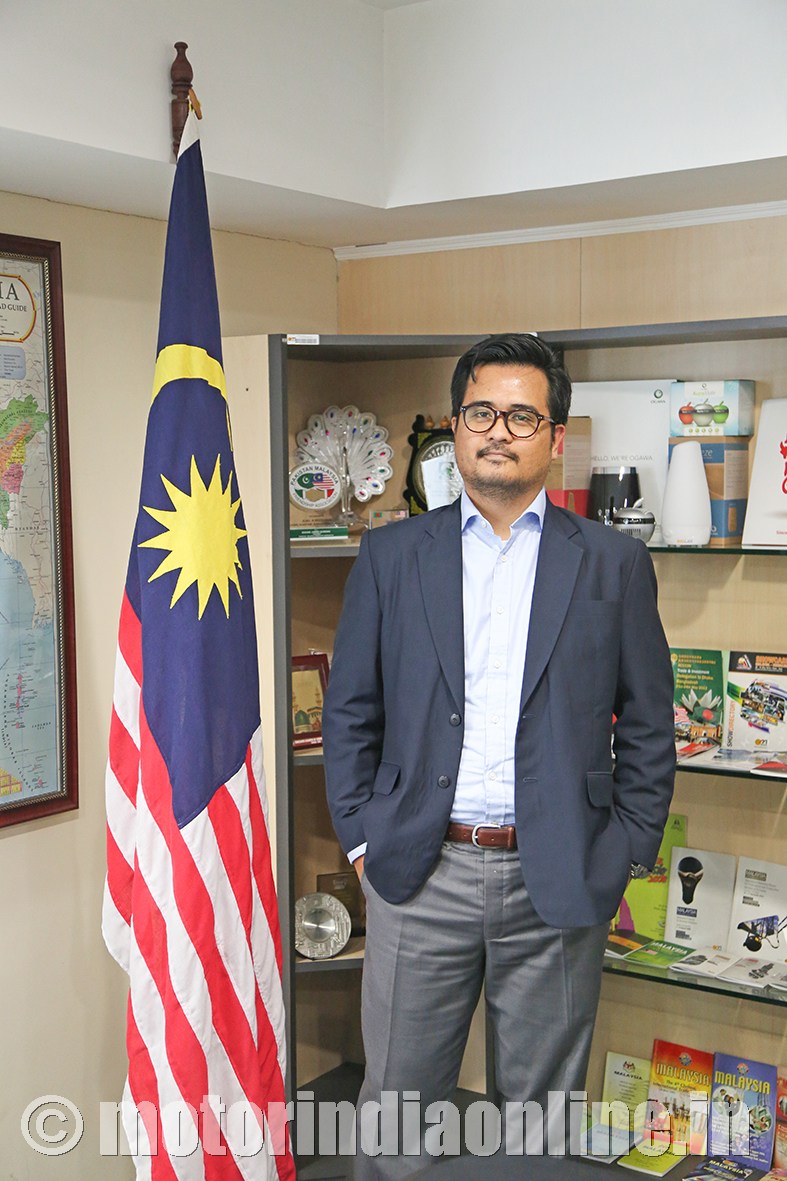By R. Natarajan, Managing Editor & Publisher
Mr. Muzzafar Shah Hanafi, the newly-appointed Counsel of Trade for the Consulate General of Malaysia in Chennai, feels that the Malaysian markets, including the automobile sector, should look beyond the conventional way of doing business. “Counterparts and rivals in the market could now be seen as potential partners for a better growth,” said Mr. Hanafi to MOTORINDIA in his first-ever interview to the media after assuming office.

The Counsel explained that after exploring the automotive sector in Malaysia, the Indian market was seen offering an opportunity for the country to go global. His focus is also on the growth of companies in the SME sector in both the countries.
With India being an automotive powerhouse, Mr. Hanafi believes that it would be impossible for the Malays to sell components or vehicles in the Indian market without partnership. Hence a new way of doing business is adopted here by promoting mutual trade and partnerships.
A mutually beneficial situation arises whilst approaching the SMEs in India, as it allows them to go global and explore the Malaysian markets. “And through the same platform, we get an insight into the foreign companies’ working”, said Mr. Hanafi.
Mr. Muzzafar Shah Hanafi, holding a Bachelor’s degree in Information Technology, joined MATRADE in 2008 and was given the portfolio of promoting Malaysia’s tech industries in global markets. Considering his valuable contributions, he was promoted as Trade Commissioner, MATRADE, Chennai, on June 1 last, where he is responsible for promoting trade between Malaysia and the south Indian region, Bangladesh, Sri Lanka, Maldives and Bhutan.
The non-Malaysian automobile manufacturers in the country such as Honda, Toyota or Izuzu have a strong supply chain of parts and components from overseas. However, for the local Malaysian manufacturers to gain that supply chain, expansion is the only option left.
“Along with India, the Malaysian market also has strong connection with Eastern and Western Europe, Russia, the US and North Africa as well”, Mr. Hanafi explained.
He hopes to leverage on the Indian automotive industry’s potential to understand how to enter into partnerships with MNCs in Japan or Korea.
Malaysia, being a part the Organization of Islamic Cooperation (OIC), an association of Muslim majority countries, shares resources within and agrees on mutual development. This allows the country to have strong connection with the Middle Eastern countries, creating huge demand for automobile parts and components.
When the previous Government sold the first national car company, Proton, in 2017 to China’s Geely Automobile Holdings, the newly elected Prime Minster, Mr. Mahathir Bin Mohammad, had the ambition to set up another national car project. However, unlike the last time, this project will now look to gain support from the private sector in the form of collaborations with international automobile companies.
Answering a question if there is any new National Automotive policy for Malaysia, Mr. Hanafi said: “The Malaysian Government, being relatively new, needs a little more time to settle. However, there are plans to draft an Automotive Policy with its focus on electro mobility. Also, while living in 2018, we cannot overlook discussing environmentally friendly industries and electric vehicles (EVs).”
Policies such as ‘Make in India’ have invited huge FDIs over the months. The new Malaysian Government, while hoping to attract more FDIs, sent a team of researchers to India soon after the Prime Minister, Mr. Narendra Modi’s visit in May. The visit has been arranged to reciprocate Mr. Modi’s visit to Malaysia and strengthen the relationship between the countries. “The team will study the policies of the Indian Government and try to create the same for Malaysia, in order to attract more FDIs. This might be one of the future plans for us,” said Mr. Hanafi.
Referring to the growing relationship between the two countries, he explained that the new Government is set on providing equal opportunities for India to explore the Malaysian market, strengthening the historic bilateral relationship. Tamil is recognized as one of the national languages there, and more than 10 million people of the total population of 32 million are of Indian origin, making them the third largest ethnic group in the country.
This creates an advantageous platform for Indian companies, particularly from Tamil Nadu, to easily access the Malaysian markets.
Mr. Hanafi also hopes to leverage on the different angles that the 2011 Malaysia-India Comprehensive Economic Cooperation Agreement (MICECA) provides. The agreement covers trade in goods and services and the overall development of the economy. “There are a lot of angles that we can leverage on this G to G agreement,” he concluded.